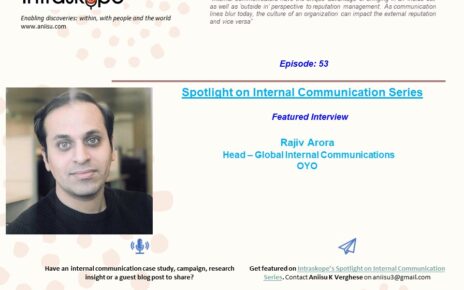Organizations and those leading employer branding often play narratives in their minds and with other stakeholders, preventing commitment and progress. Continuing with the series of blogs on employer branding, I am sharing a few myths that warrant debunking.
- Myth: Let’s hire an agency to do our employer branding
Fact: No agency or consultant can help if you haven’t got your basics right
Unless organizations take their people along the journey, there is no hope for consultants to come in and solve the challenges the brand faces. The emphasis on employer branding is ranked among the top 5 priorities by CMOs as they attempt to improve reputation and recall. Organizations should first focus on developing a strong internal employer brand before seeking outside help from agencies. This includes helping staff understand the company culture and values, communicating effectively with all stakeholders – including potential candidates and inviting employees to pitch in on employer branding efforts.
2. Myth: People will be attracted if we highlight the brand sufficiently
Fact: Candidates are discerning and want to know if the brand is purpose-driven and empathetic
With the distinction between corporate and talent brands blurring, stakeholders are watching actions by entities and leaders even more closely than before. The expectations of leaders and organizations to be transparent and direct continue to rise. Job seekers are increasingly looking for organizations that have a clear sense of purpose and are making a positive impact on society. Many are reconsidering their organizations and re-evaluating career decisions.
3. Myth: People will be drawn to competitive salaries and benefits
Fact: Most prefer joining companies that focus on the planet before profits. They want to see that the organization is interested in making a difference to society. A survey by Glassdoor reveals that people are drawn more to the company’s mission and culture than compensation. Millennials, especially, prioritize a company’s impact on society and the environment over traditional benefits such as salary and bonuses. Companies that focus on societal and environmental impact in their employer branding efforts can gain from an increase in retention.
4. Myth: People will join their own industry because experience matters
Fact: Most are changing industries because companies are seeking skills and are not fussed about the experience as much. Many job seekers are looking to transition to different industries because of a desire for newer challenges and opportunities. Research by the Harvard Business Review shows that companies are increasingly valuing skills over industry experience and are more willing to hire candidates from different backgrounds and industries.
To avoid getting caught in unhelpful narratives spun by leaders and organizations, it is vital to be aware of myths surrounding employer branding. As an advocate of employer branding, you have a responsibility of busting these myths before they engulf your plans.
Like the article? Share your comments here.
Other Employer Branding articles you may like:
Why Aren’t We An Employer of Choice?
Employer Branding 101: Is Your Organization Ready?
Employer Branding 101: Begin with the Fundamentals
Interested in similar content? Look up my blog www.aniisu.com and website www.intraskope.com
Interested in getting stronger with your employer brand? Look up these resources.
Want to gauge where your organization stands with employer branding? Take a FREE Employer Branding Readiness Assessment
Keen to get advice on communication? Look it up here: https://www.intraskope.com/advantage
- Learn: Internal Communications Fundamentals Course on Thinkific
- Internal Communications Series: https://forms.gle/KcqmPzLwq7NQi5Km6
- Chat with Aniisu – Internal Communications: https://www.instamojo.com/intraskope/connect-with-aniisu-60-minute-personalized-d/?ref=store
- Internal Communications workshops: https://bit.ly/2zdBRl1
#employerbranding #employerbrand #commsmyths #employerbrandingmyths #empathy #career #talentbranding #talent #GBScomms #GBS #employercomms #brand #internalcomms #internalcommunications #experience #commsexperience #brandreadiness #Poland #Polandcommunication #Polandemployerbranding #EUcommunication



